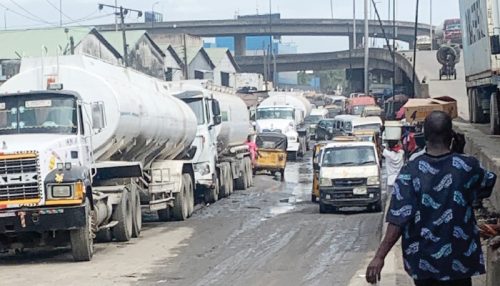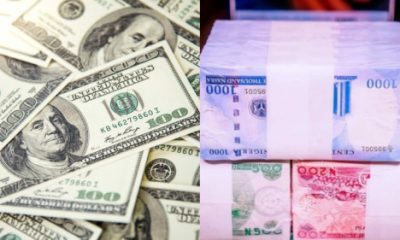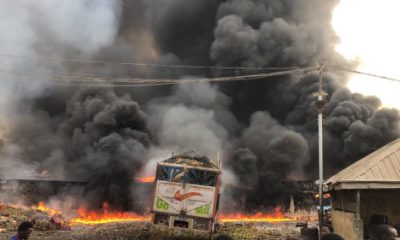News
IMF: Why We Asked Nigeria To Remove Fuel Subsidy
And what’s the reason why we counsel against such generalised subsidies is very simple. It tends to be highly regressive, meaning the benefits of such you know, fuel subsidies tend to accrue to the rich and segments to reach out to people and the poor people.

The International Monetary Fund (IMF) has explained why it advised Nigeria to remove fuel subsidies, adding that the subsidy regime was robbing the poor for the rich.
The Director of the African Department of the Fund, Mr. Abebe Selassie, provided insights into the organisation’s position, at the ongoing Spring Meetings of the IMF and World Bank in Washington DC. According to him, the Fund had provided robust content and how the poor could benefit from the policy in the provision of social safety nets.
His words: “Subsidies are about resource allocation internally within Nigeria. So Nigerians, the people of Nigeria pay for these subsidies.
“And what’s the reason why we counsel against such generalised subsidies is very simple. It tends to be highly regressive, meaning the benefits of such you know, fuel subsidies tend to accrue to the rich and segments to reach out to people and the poor people.
“So it’s people that are driving these large cars, with big houses are wanting to see subsidised fuel. They’re the ones benefiting relative to the poor and vulnerable in Nigeria.
“So you know, not only people paying for the subsidies Nigeria, it’s the poorest segments of society that actually are losing out and resources could instead, of course, be used to improve conditions for poorer people instead of accruing to rich people.
“That’s why subsidy reform is important. We applaud the government for the steps government took to reduce the extent of subsidies. I think as oil prices have become volatile, the level of subsidy has also moved up and down. “But I think you know, the direction of travel, I think, to remove the subsidies and use the resources to provide social protection for the most vulnerable households.”
Mr. Selassie revealed that the IMF has provided the sum of $58 billion to African countries since the outbreak of the COVID-19 pandemic and pledged it would do more.
The IMF chief cautioned African countries against commercial loans for the purposes of refinancing because of the current rate hike in most economies.
He advised that instead, countries South of the Sahara that have debt service challenges should look inward for domestic resource mobilization, which would be easier to deal with. The Director criticised the practice of discriminatory tax exemption to some companies and not extended to others.
These special favours to some companies, he observed reduce the effectiveness of governments to optimise tax revenue..
Positive developments in Africa
“Mr. Abebe said that after four challenging years and multiple shocks, Sub-Saharan Africa’s economy appears to be on the mend.
“We expect economic growth to rise to 3.8 per cent in 2024, from 3.4 per cent last year. After peaking at almost 10 per cent in late 2022, inflation has nearly halved to around 6 per cent in the early part of the year thanks to decisive action by central banks.
“This includes slower food price increases, a positive development for a region where the cost of crises has been acute in recent years. In addition, fiscal consolidation efforts are starting to pay off, with the median public debt stabilizing at around 60 per cent of GDP, halting a 10-year upward trend.
“And with global financial conditions easing, a few countries have been able to return to international markets, ending a two-year hiatus. These are encouraging signs.”
The Missing Chief said, however, “ the region is not out of the woods yet. Far too many countries still face a funding squeeze.
What’s heart breaking about Africa- IMF MD
Also, IMF Managing Director, Mr. Kristalina Georgieva, described as “heart-breaking”, the situation in which African countries spend large amounts of their revenue on debt servicing.
Her words, “African countries spend on average, 12 percent of their revenue on on debt servicing. This is more than double from the Las decade. They were at 5 percent a decade ago.
“What is heartbreaking is that in some countries, the debt payments is up to 20 per cent of revenues.
“What does that mean? It means that what could have gone to education, health, for investments in infrastructure and jobs is being sucked away by debt servicing. The ground for public capital to come in.
“We know that part of the reason is that interest rates are quite high. So what does it translate into for authorities in Sub-Sahara Africa?
“First, we see that those who have worked on public finances, to clean clean the ground for private capital to come in are doing better.
“When you have a tax/revenue of 26 per cent like Cote d-Ivoire, you can bear the debt burden. When you 12 per cent to GDP you cannot.”
The MD said that the IMF’ major peg of interaction with member countries in the region was focusing on the mobilisation of domestic resources, improving public spending and mobilising local savings with which to achieve growth prospects.
She added that African countries must keep their eyes on inflation because that problem remains unsolved.
Ms. Georgieva noted that Africa was blessed with huge potential, with huge a youth population that was earger to work and that its leaders should allow Africa’s resources to work for Africans.
News
States Will Pay Only Sustainable Minimum Wage As Labour Justifies N615,000 Minimum Wage Request – Governors

Governors yesterday sounded a note of caution to workers against unduly high expectations from the minimum wage negotiations.
States will pay only implementable and sustainable wages, they said, but expressed commitment to improved salaries for workers.
Members of the Nigeria Governors’ Forum (NGF) said they would ensure workers in their states earn more than they currently do.
The Federal Government on January 30 inaugurated a 37-man Tripartite Committee on Minimum Wage.
It was tasked with recommending a realistic national minimum wage that aligns with the current economic realities, but an agreement is yet to be reached.
The governors are represented by one each from the six geo-political zones on the committee, which also has Federal Government officials, the labour movement and the Organised Private Sector (OPS).
“As members of the committee, we are reviewing our individual fiscal space as state governments and the consequential impact of various recommendations to arrive at an improved minimum wage we can pay sustainably,” the governors said.
Their position is contained in a communique issued on Wednesday after a virtual meeting – the same day workers marked May Day across the country.
The Nigeria Labour Congress (NLC) is demanding a N615,000 national minimum wage per month.
It said the figure was a product of a painstaking effort through which it captured the cost of living of Nigerian workers and masses in all parts of the country.
Labour said the figure was essentially an outcome of independent research conducted by the NLC and Trade Union Congress on the cost of meeting the primary needs of an average family.
The current N30,000 minimum wage expired on April 18.
Minister of Labour and Employment (State) Nkeiruka Onyejeoacha told workers that the new minimum wage when approved will take effect from April 1.
Vice President Kashim Shettima also told workers at the May Day rally that the Federal Government is committed to a living wage for workers.
He hinted that the tripartite committee had not agreed.
But Labour threatened a showdown should the minimum wage issue not be resolved by May 31.
Former NLC president, Senator Adams Oshiomhole, urged Labour to make realistic and affordable wage demands that will also be sustainable.
While the talks continue, some governors have announced new wages for their workers.
Edo Governor Godwin Obaseki announced N70,000; his Cross River counterpart Bassey Otu promised N40,000.
The NGF, in the communique signed by the Chairman/Kwara State Governor AbdulRahman AbdulRazaq, indicated that governors can only pay what they can afford.
It reads: “The forum celebrates with workers across the country for their dedication to service and patience, as we work with the Federal Government, labour, organised private sector and relevant stakeholders in arriving at an implementable national minimum wage.
Minimum wage delay
“While we acknowledge various initiatives adopted of recent by way of wage awards and partial wage adjustments, it is imperative to state that the 37-member tripartite committee inaugurated on the National Minimum Wage, is still in consultation and yet to conclude its work.
“As members of the committee, we are reviewing our individual fiscal space as state governments and the consequential impact of various recommendations, to arrive at an improved minimum wage we can pay sustainably.
“We remain committed to the process and promise that better wages will be the invariable outcome of ongoing negotiations.”
The meeting also discussed the revised National Policy on Justice (2024 -2028) from the just concluded National Summit on Justice held April 24/25 in Abuja.
“Members agreed to consider the submissions from the summit as may concern their individual states, including recommended legal amendments, administrative improvements, and policies to strengthen the justice sector.
“Also, the forum committed to looking into issues bordering on the remuneration of state judicial officers and the infrastructure of the courts,” the communique adds.
The governors commiserated with their colleagues Dapo Abiodun (Ogun) and Siminalayi Fubara (Rivers) over the petrol tanker and gas explosions that occurred on April 26 and 27 in both states.
They called for proper maintenance of trucks, especially those fitted to convey Compressed Natural Gas (CNG).
The governors recommended appropriate training for truck drivers and resolved to engage relevant ministries, departments & agencies (MDAs) to align the activities of federal regulators with the operations of officials at the sub-national level.
The communique adds: “Members received the outgoing Country Director, Mr. Shubham Chadhuri, and the incoming Country Director, Mr. Ndiame Diop, of the World Bank, to discuss the Bank’s vision for transitioning.
“Mr. Chadhuri appreciated the forum for the strategic role it continues to play in coordinating collective action for developmental change.
“He (Mr. Chadhuri) applauded the non-partisan character of the forum, the professionalism of its secretariat, and state governments’ commitment to mutual accountability mechanisms such as performance-based financing interventions by the bank.
“Members expressed confidence in the choice of Mr. Diop, to lead the collaboration going forward and look forward to a sustained and deepened relationship.
“The forum received a presentation from the National Human Capital Development (HCD) Program – Core Working Group Secretariat, led by Ms. Rukaiya El-Rufai and Dr. Ahmad Abdulwahab.
“Both highlighted the marginal progress made by States and its contribution to Nigeria’s Human Development Index (HDI), especially across health, nutrition, education, and labour force participation.
“Having reviewed the previous program design and national strategy, a revised governance and implementation roadmap was proposed to scale up impact and ensure sustainability.
“Members pledged to support the effective domestication of proposed revisions to the national HCD strategy.
“Members received a briefing from Mrs. Oyinda Adedokun, Programme Manager, State Action on Business Enabling Reforms (SABER) Federal Ministry of Finance Programme Coordination Unit.
“The briefing highlighted states’ performance in implementing advocated reforms relating to land administration, the regulatory framework for private investment in fibre optic infrastructure, services provided by investment promotion agencies and public-private partnership units, efficiency and transparency of government-to-business services under the World Bank financed programme.”
News
Anambra: Woman Brutalizes, Demotes 19-Year-Old House Girl To Primary 3

Anambra State Government, through the Ministry of Women and Social Welfare, has rescued one Chidiebere Otenyi, another victim of domestic abuse in Ezinifite, Aguata local government area of the state.
Help came the way of the victim after a whistle blower brought her plight to the attention of the Commissioner, Mrs Ify Obinabo.
Reacting in her office in Awka after the team sent from the ministry had rescued the girl, Obinabo, who was furious over the dastardly act, vowed to deal with the perpetrator, Mrs Martha Umenweke.
Obinabo, who was angry over the extent of damage given to the girl, stated that the culprit won’t go scot-free since she had the mind to inflict injuries and pain on another person
The victim, 19-year-old Chidiebere Otenyi from Nkanu, Enugu State, said that her madam, Martha, accused her of stealing her twenty five thousand naira.
Chidiebere, who was still in pain at the time of the rescue, said she had lived with Martha for a year and four months, but she gets severely punished at the slightest provocation, especially being starved.
Upon further questioning, it was discovered that the 19-year-old was still in primary 3.
According to her, her boss demoted her when she came.
On why she brutalized her ward, Mrs Martha Umenweke, who is in her late sixties, claimed that Chidiebere stole her money.
It was also gathered during the rescue that Martha had an alibi one, Mr David, who, after she had beaten the girl, tied up her hands and legs.
The case has been handed over to the police for further interrogation and prosecution at the Children, Sexual and Gender Based Violence Magistrate court in Awka.
News
Fuel Supply: 9,000 Marketers May Lose Licences, Seek FG’s Intervention

•IPMAN begs NMDPRA, NNPC not to delist operators from sales portal to avert fuel crisis
•Queues persist as more filling stations open for sale, pump price drops marginally
As Nigerians battle fuel scarcity, over 9,000 oil marketers are on the verge of losing their operating licences.
As a result, the Independent Petroleum Marketers Association of Nigeria is urging the Nigerian National Petroleum Company Limited to extend its final deadline for licensing renewal to July.
It also appealed to the Nigerian Midstream and Downstream Regulatory Authority to release 9,000 already processed licences to its members.
The association made the request known in a release signed by the National Public Relations Officer, Chief Chinedu Ukadike, on Thursday in Abuja.
Recall that IPMAN in a statement on Sunday lamented the slow pace of marketers’ licence renewal by the NMDPRA.
The NNPCL had placed a deadline of April 15, 2024, for marketers to renew their licences or risk closure to access their customer express portals for the purchase of petroleum products from NNPC Retail Limited.
But IPMAN requested an extension, saying the extension would enable marketers to reconcile their licenses and reduce panic buying by members of the public aggravating the present scarcity of petroleum products.
The statement read, “The Independent Petroleum Marketers Association of Nigeria are abreast with current developments in the downstream sector of our petroleum industry and wish to state that the latest information reaching us from the Nigerian Midstream and Downstream Petroleum Regulatory Authority states that they have already processed more than 9,000 out of the 15,000 licenses they are expected to process for our members within this period.
“Marketers are fast-tracking the processing of their licenses to avoid the impending closure of their customer express portals for purchase of petroleum products from NNPC Retail Limited.
“We, therefore, use this opportunity to appeal to the management of the NMDPRA and NNPC Retail Limited to respectively release the processed licenses and extend the deadline for delisting of marketers from their express portals. If our request is granted, it will ease the tension of panic buying by members of the public in order not to aggravate the present scarcity of petroleum products.”
Giving further clarity in a telephone interview, Ukadike said, “The release is to appeal to the NNPCL and NMPDRA to please extend the final deadline to July so that it would enable them to reconcile the licences so that they will not be unduly shut out off the portal and that is IPMAN appeal.”
Our correspondent contacted the NMDPRA South-West Regional Coordinator, Ayo Cardoso, over the plea of the marketers.
Responding, Cardoso told The PUNCH that the NMDPRA would take a look at the request and act accordingly.
“We will look into their request,” he responded during a chat with our correspondent.
The PUNCH recalled that amid the ongoing fuel crisis, IPMAN had on Tuesday declared that it would shut down the 30,000 stations operated by IPMAN members across the country if the Federal Government failed to pay the N200bn that was being owed marketers.
IPMAN specifically said the NMDPRA had refused to clear the debt, which had continued to accrue since September 2022.
It disclosed this in a communique issued in Abuja by the Chairman of IPMAN Depot Chairmen Forum, Yahaya Alhassan, over the non-payment of marketers’ bridging claims.
Fuel scarcity lingers
In their quest to buy the currently scarce Premium Motor Spirit, commercial drivers in Abeokuta, the capital of Ogun State have started keeping vigil at fuel stations.
The Federal Government on Wednesday said it had begun a 15-day emergency fuel supply to ensure the commodity circulates across the length and breadth of the country to immediately cushion the scarcity.
The government also disclosed that vessels importing Premium Motor Spirit would continue to berth at the shore to discharge petrol to different depots, from where the product would be distributed to different filling stations.
But despite these promises, the product is yet to be available to residents as commercial drivers now keep vigil at filling stations in Abeokuta, Lagos, Oyo and others.
Commercial drivers have raised transport fares as the majority of them now patronise black marketers who sell a litre of petrol at N1,200 per litre or more.
A commercial driver, Adio Adegoke, at Slaab filling station in Abeokuta, told our correspondent that he had slept in his taxi in an attempt to buy fuel.
“I had to park my car here since 7:30 pm yesterday when my tank went empty. I slept at Divine Pax Oil and Gas filling station,” he said.
Also, a mechanic, Lekan Ade, corroborated the claims of the taxi driver stating, “I just bought it there this afternoon for one of my customers, they are still selling it as we speak at the rate of N950 per litre.”
When our correspondent visited the fuel station, aside from being written on their metre, an attendant was also seen warning motorists to go if they could not buy the product at that rate.
Another driver, Adeoluwa Onasanya, told one of our correspondents that many slept at the filling station before they could get the product.
The PUNCH observed that the persistent fuel scarcity seems to be a huge source of income for black marketers, as young boys and girls were sighted by the roadside in Lekki, Ajah and other parts of Lagos advertising fuel in jerry cans.
One of our correspondents observed that along the Egbeda-Idimu-Ikotun axis of Lagos, the black marketers sold five litres of the product for N6,000.
A young man who gave his name as Mr John said, “How many litres do you want? We sell 5 litres here for N6,000. At the fuel station, they sell a litre for N1,200, we have to bribe the fuel station to be able to get the product, I can give you any amount of litre that you want,” he boasted.
The PUNCH observed a long queue of vehicles at the NNPC filling station along the Cele Expressway which was selling at N568/litre, while the AP filling station at Barracks Bustop was selling fuel at N700/litre with a long queue of motorists scrambling to buy fuel.
As the queues refuse to ease off at the filling stations despite the promises from the government, Nigerians are worried that the fuel crisis might degenerate into loss of sources of income.
-

 News2 days ago
News2 days agoBlack Market Dollar (USD) To Naira (NGN) Exchange Rate Today 1st May 2024
-

 News2 days ago
News2 days agoNew Minimum Wage Will Take Effect From May 1, 2024 – FG
-

 News2 days ago
News2 days agoLagos-Calabar Coastal Road: ‘You Have No Claim’ – Umahi Attacks Landmark Beach Owner
-

 News2 days ago
News2 days agoLagos- Calabar Coastal Project: Peter Obi Inciting Igbos Against Tinubu Govt – Umahi
-

 News1 day ago
News1 day agoVideos: Lagos Uncovers 86 Under-Bridge Apartments Where Tenants Pay N250,000 Rent
-

 News2 days ago
News2 days agoLagos Coastal Highway: FG Begins Payment Of N2.75billion Compensation To Affected Nigerians
-

 Breaking News1 day ago
Breaking News1 day agoPhotos: Hoodlums Clash In Lagos, Set Market On Fire
-

 Business23 hours ago
Business23 hours agoFidelity Bank Records A 120.1% Growth In PBT To N39.5bn In Q1 2024











